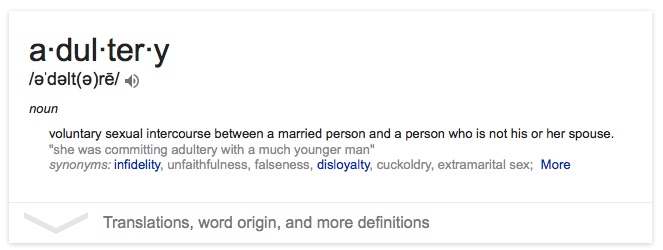Last week I got married. This week I am on a date, but not with the person I married. With one of our wedding guests, actually. We spend a sexy afternoon at his place and then go out to our favorite Thai restaurant.

“So is this your first time committing adultery?” he asks after dinner.
“What?”
I am completely taken aback. He’s driving and looking ahead at the road, but I stare at him until he turns his head toward me.
“What!” he says, flashing me a big grin. “This is your first date since your wedding, isn’t it?”
“I guess,” I say, “I just hadn’t really thought about-”
And I start laughing and we laugh together. It’s not easy to catch me off guard, and I think he is enjoying the moment.
Adultery. It’s a word that carries a lot of weight from my Christian upbringing. It’s not one I thought I’d ever hear applied to myself. I spent nearly a decade being fiercely monogamous, even while my husband was having an affair. Adultery was always going to be a word used for others, even my husband, but never myself.
Now I’m curious. What does the word adultery mean? The concepts that come to my mind immediately are cheating, betrayal, infidelity, faithlessness. I’ve been taught to think of someone who commits adultery as a liar, a homewrecker, a person without integrity. Adultery and lack of consent seem inextricably linked.
I go online and do a search for the word adultery. Google offers me its own definition before listing other search results
The first link, Wikipedia, expands this definition by omitting the word voluntary and including all sexual acts rather than just intercourse. I scroll down the page and click through links. Most online dictionaries include the word voluntary in their definition, by which they mean only the consent of the person committing adultery. No page I visit talks about the consent of the spouse or any other persons involved.
!["I promise to love and support you [...] through your relationships and connections with others" we vowed to each other last week.](https://wp-media.patheos.com/blogs/sites/575/2016/05/IMG_3637-300x225.jpg)
For me, the connotation of cheating is strong. Adultery seems to imply that the spouse does not consent to sexual acts. I wonder how much of this understanding is influenced by my Christian upbringing. How do people in sex positive subcultures think of adultery?
I ask this question in an Open Relationship Facebook group. I get dozens of comments, and the responses are split roughly 50/50. About half of the commenters hate the word adultery and think it should be reserved for non-consensual activities. To them it means cheating. The other half thinks we should reclaim the term, much like the sex positive community reclaims slurs like slut or being easy. To them it’s an opportunity to introduce the concept of consensual adultery.
Reading the arguments for and against reclaiming the word leaves me even more undecided. I just don’t know what to do with the word. A part of me thinks I could never reclaim a word with so much baggage. Another part gently reminds me that I once had even worse connotations for the word Witch. Never would I have believed I’d be asking questions about adultery on a blog called Born Again Witch.
What do you think? Has adultery always meant and will always mean cheating? Is there such a thing as consensual adultery? Could or should the term be reclaimed?















